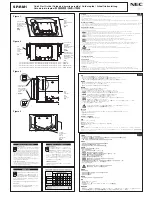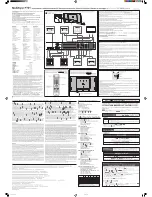
The CPU will be reset when the power is on. The components R506; D506 and C506 on pin4 of
I501 ensure correct start.
The +5V voltage is fed into I501 via pin5; an 8MHz resistor is connected on pin7, pin8 of I501
to generate the CPU clock for the software execution. The user key control input is fed to an A/D
converter on pin14 via R516~R519 and S516.
The horizontal control signal circuits are derived from pin #17, #19, #20 and #34
Which are fed to the CS circuit Q402; Q404; Q480 and Q489.
There is a low power override pin on pin30 of I501 this pin is pulled-up to
12V by R984, R986 on drive board PWB-0176and connected to pin5 of the signal cable. When the
signal cable is disconnected from the computer, this pin is high and the Self-test pattern will work
as described below
When you disconnect the signal cable from the PC, and power on the monitor, the display will
produce a self-diagnosis. The self-diagnosis function is useful to confirm the monitor is working
correctly.
When the signal cable is connected to the computer, this pin is low and the power saving circuit
will function, the CPU will generate a power saving signal on pin29 & pin31 of I501
The monitor is design to have the DDC 1/2b functions, communication between |the monitor
and computer for DDC is via pins24, 25 of I501 that are defined as SDA, SCL signals. The
computer will read out the EDID data from the EEPROM I502 via IIC data lines. The EDID data is
written into the EEPROM in the factory during production.
The memory size for EDID data is 128 bytes shared from EEPROM 152 that has 4K bytes
memory size
.
6-5. How to enter into the factory setting:
The monitor includes 10 sets of factory-preset timings although only some of the timings are
fine-tuned by auto alignment during production.
Switch off the monitor, push and hold down the "
<
" key and power on again, wait 1.0 second
NO SIGNAL
PLEASE CHECK
SIGNAL CABLE
SELF TEST PATTERN












































